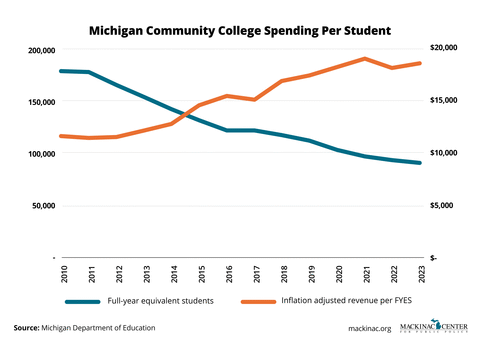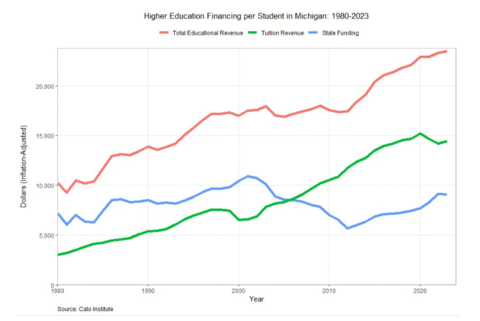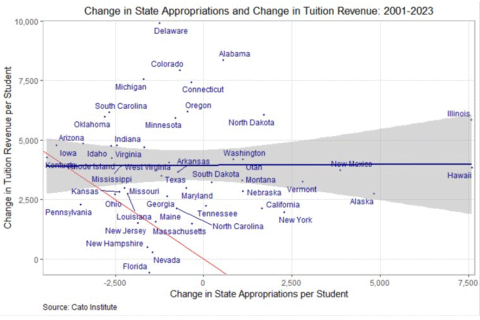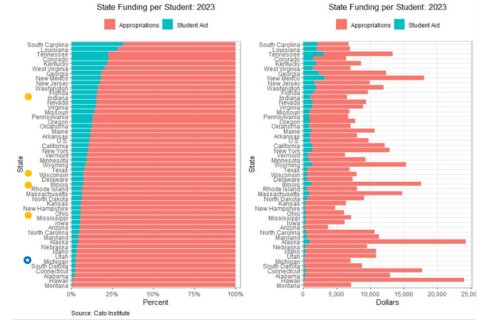Lawmaker: $4.4B of corporate subsidies is ‘legislative malpractice’
Rep. Dylan Wegela says money should have funded infrastructure, schools and communities
Since 2023, Michigan has authorized $4.4 billion of select corporate business subsidies.
Assuming that money is fungible, what could it have bought Michiganders?
The average price of a ticket to a Taylor Swift concert in 2023 was $1,088, as calculated by CNBC. At that rate, Michigan could have bought Taylor Swift tickets for 40% of the state population.
Or, Michigan taxpayers could have bought 33 million days — 90,000 years and then some — at Disney World via $130-day passes.
The money could have funded child care and living expenses for the roughly 10,000 Michigan kids in foster care. It could have lowered Michigan’s personal income tax rate to 2.85%, down from 4.25%.
Rep. Dylan Wegela, D-Garden City, told CapCon that the giveaway should be considered “legislative malpractice.”
He cited a 2023 report from the Public Service Consultants, which estimates Michigan underfunds transportation infrastructure by $3.9 billion, and an Education Law Center report that said public education is underfunded by $4.5 billion.
“Michigan’s $4.4 billion in corporate handouts should be considered legislative malpractice,” Wegela wrote in a text message. “This transformational sum of taxpayer dollars should have been used to give the people of Michigan the high quality public schools, infrastructure, and strong communities they deserve.”
“Simply put, public dollars should stay in public spaces and be used for the good of all,” Wegela wrote. “Healthy, affordable, and functional communities are the real, long-term incubators for job creation, not short-sighted, billion-dollar handouts. If we truly want to have a state that serves our communities, we must end this system of corporate greed and instead prioritize the people.”
Michigan is fighting population loss. The state has lost 33,400 people over the past five years, a 0.3% decrease, according to Mackinac Center Research. Meanwhile, the national population grew by 1.9% over the same time.
John Mozena, president of the Center for Economic Accountability, said that previous subsidies gave taxpayers a bad return on investment.
“The state’s taxpayers have pumped billions and billions of dollars into programs that promised growth and prosperity, only to get stagnation and frustration in return,” Mozena wrote in an email.
For example, Mozena said that Michigan promised Ford Motor Co. $1.7 billion for its electric vehicle plant in Marshall before the company cut 800 jobs amid low consumer demand.
“If medicine doesn’t make you more healthy, you stop taking it,” Mozena wrote. “If a diet doesn’t make you skinnier, you stop following it. If an exercise doesn’t make you stronger, you stop doing it. Corporate welfare isn’t making Michigan’s economy any better, so it’s time to stop funding it.”
Sen. Aric Nesbitt, R-Porter Township, said that Michigan Democrats have reverted to the failed policies of picking winners and losers with taxpayer dollars.
“The past 18 months have seen Governor Whitmer and the Democrat majority blow a $9 billion budget surplus on multinational corporations, union bosses, and West Coast environmentalists,” Nesbitt wrote in a text message. “Furthermore, this Governor decided to rack up our state debt on overpriced road construction (thanks to prevailing wage) and raiding the teacher pension fund.”
Michigan Capitol Confidential is the news source produced by the Mackinac Center for Public Policy. Michigan Capitol Confidential reports with a free-market news perspective.


 State climate conference to tout clean energy plans that will raise electricity costs
State climate conference to tout clean energy plans that will raise electricity costs
 Bills would redirect corporate welfare to pave roads
Bills would redirect corporate welfare to pave roads
 Michigan State Police lease first EV at $1,062 per month
Michigan State Police lease first EV at $1,062 per month





 Michigan manages to lose students while hiking higher ed spending
Michigan manages to lose students while hiking higher ed spending
 Report lays out costs of banning short-term rentals,
Report lays out costs of banning short-term rentals,
 There is no such thing as ‘the state’s dime’
There is no such thing as ‘the state’s dime’